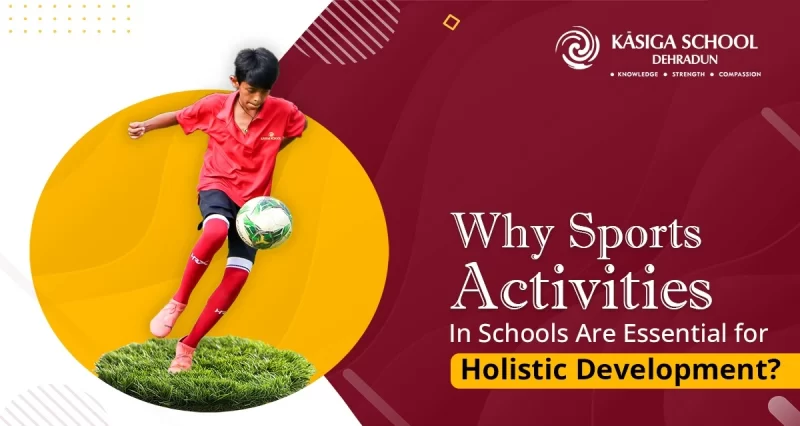When we think of a student, we instantly imagine a youngster carrying a large school bag filled with books. However, we at Kasiga believe that learning should not be limited to academics. Since simply reading or studying turns youngsters become bookworms, many other activities such as sports or games play an important part in a student’s overall development.
Still, some individuals & at times even parents do not understand how important sports are to their children’s lives. They frequently pose the question, “What makes sports a worthy investment for students other than education?” Though studies are crucial, there is no denying that athletics contribute to a child’s overall development & growth.
Believe it or not, the facts in today’s blog will undoubtedly prompt you to consider the importance of sports in kids’ lives & to include them in your child’s daily routine on a regular basis. So without wasting much time, let’s look at how sports activities play a significant role in a student’s life.
Benefits of Sports Activities in Schools for Students
Promotes Self-esteem & Self-confidence
Several studies have found that students who engage in sports activities in schools have better levels of self-confidence & self-esteem than their classmates who do not. Having a teammate pat them on the back, give them a high-five, or shake their hand after a game can boost a child’s self-esteem, whereas encouragement & congratulations from the coach, parents & teammates may significantly boost a player’s self-confidence.
Helps Control Emotions
You’re all aware that sports at school are an excellent method to express yourself. Young athletes may require guidance from an experienced coach with a background in fitness to develop effective coping mechanisms & enhance their performance. When taught at an early age, these abilities help students deal with the multitude of challenges they experience as adults.
Helps Develop Discipline
Discipline is a feature of all successful people as it allows them to maximize their potential & achieve their goals. And when it comes to sports, every sport requires mental, physical & tactical discipline. When children participate in sports, they learn the importance of self-control, teamwork & discipline by having to follow the rules & listen to their coaches.
Promotes the Development of Social Skills
Children who participate in sports activities in schools learn how to deal with adults, classmates, coaches, officials & teammates of all ages & ability levels. Additionally, kids get to meet new people & develop a sense of belonging. These communication abilities, as well as the ability to get along with people, benefit them both personally & professionally.
Helps Develop Patience
“Practice makes perfect,” as they say, but you can probably anticipate what that practice & perfection entails. To thrive in any endeavor, constant practice is required & sports perfectly teach young people endurance & patience.
Helps Develop Perseverance
Sports activities in school demand the same degree of effort & perseverance as regular practice. During their preparation & competition, players go through many highs & lows and thus build resilience by learning to overcome hardship & persist. Children who learn to be resilient at an early age are better prepared to deal with stress & obstacles later in life.
Facilitates Embracing Loss
Winning always is indeed a far-fetched idea. In fact, it’s difficult to win every time. Playing sports at school is an excellent approach to instilling this concept in young people as because of it young individuals acquire a healthy attitude towards failure & disappointment.
Promotes Teamwork
By actively participating in sports, students learn the value of collaboration & start playing to the strengths of their teammates. They learn to prioritize the needs of others over their own & to keep their feeling of self-importance under control. Upon understanding the value of teamwork from an early age, they prepare themselves to be effective members of society & the workplace.
Helps to Bring Competence in Leadership
When children are captains or aspire to be captains, they acquire valuable lessons in communication, collaboration, sacrifice & leadership. They take their leadership skills off the field or court & use them to become the type of individuals who others look up to.
Promotes the Habit of Consistent Practices
Sports activities in schools promote healthy living practices such as proper nutrition & frequent exercise. In addition to this, it encourages children to value physical exercise in a way that benefits them throughout adulthood, preventing future health problems.
Conclusion
So there we have it folks! We hope that now when you want to know why sports are important, these points will suffice.
The truth is academic studies & athletic ability are linked. They function similarly to both sides of a coin. In fact, sports along with academics, play an important part in education. It helps to shape an individual’s personality & adds to their overall development.

